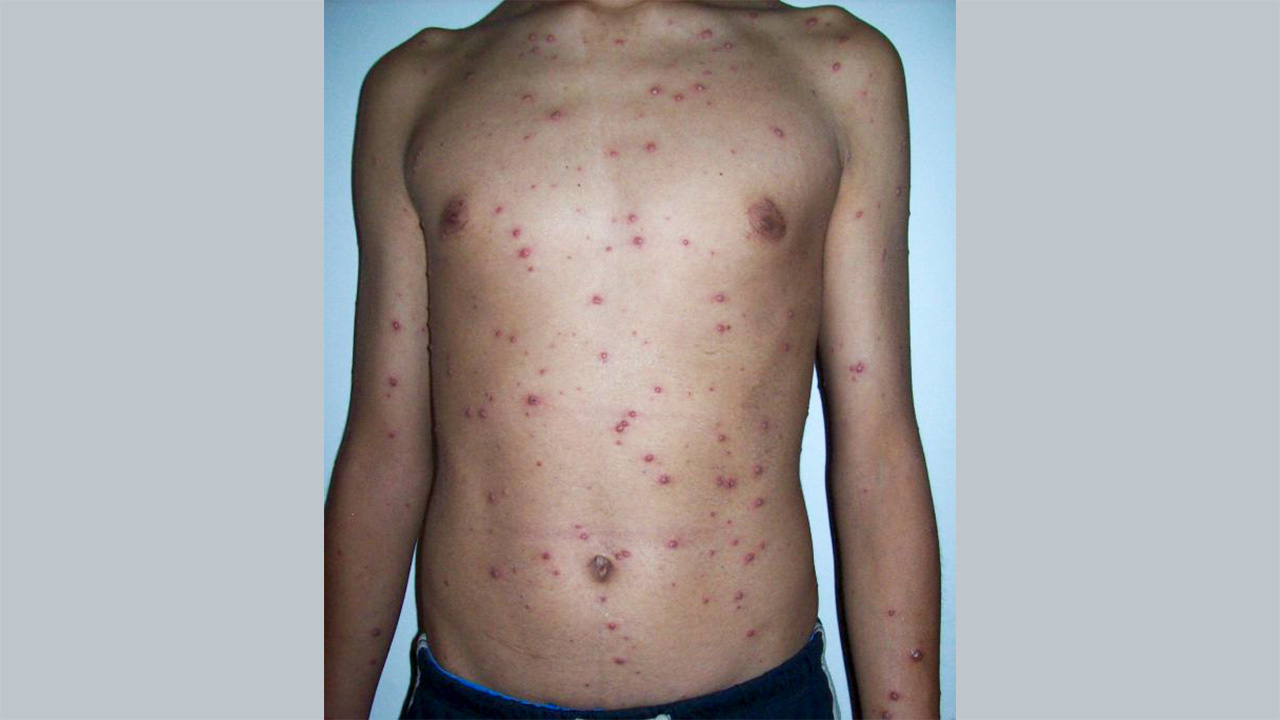Health Unit urges precautionary measures against chickenpox
 CREDIT: BUREAU DE SANTÉ DE MIDDLESEX-LONDON HEALTH UNIT
CREDIT: BUREAU DE SANTÉ DE MIDDLESEX-LONDON HEALTH UNITChickenpox causes fever, fatigue and itching accompanied by the blisters characteristic of the disease.
Fanshawe College is currently on alert due to a significant rise in chickenpox cases among post-secondary students, according to the Middlesex-London Health Unit (MLHU).
“Since mid-December 2023, we have identified over 15 cases in Middlesex-London. However, we are still trying to determine how many of these cases are linked to the Fanshawe community,” stated Dr. Joanne Kearon, Associate Medical Officer at the MLHU.
The Health Unit’s investigation found that some cases could be linked to recent travel, while others seemed to have originated locally.
“This number of cases is higher than average, so we are investigating this increase in chickenpox cases. However, no specific exposures have been identified, such as places or specific times campuses or classes,” Kearon said.
Chickenpox, a viral infection commonly associated with childhood but capable of affecting individuals of all ages, presents substantial risks within the college community. The virus spreads through airborne particles or direct contact with an infected person, manifesting symptoms such as fever, fatigue, loss of appetite, and a distinct itchy rash accompanied by blisters.
“Symptoms become more severe as people get older. And so, in the post-secondary age, symptoms can sometimes be more severe than if someone were to be infected as a child,” Kearon explained.
Though complications are relatively rare, they can be severe, especially among individuals with compromised immune systems, encompassing skin infections, brain inflammation, and pneumonia.
“If people develop severe symptoms, such as difficulty breathing, confusion, or their blisters become infected, a healthcare professional should see them.”
Of particular concern is the contagious period, during which individuals infected with chickenpox can transmit the disease several days before the rash emerges and up to five days after its onset.
Given the heightened risks associated with chickenpox during pregnancy, pregnant individuals within the college community, as well as those planning to conceive, are strongly advised to exercise additional caution.
Individuals who lack prior exposure to chickenpox and have not completed the full vaccination regimen, as well as those with weakened immune systems, face elevated susceptibility to contracting the disease.
“A person fully vaccinated with two doses of the chickenpox vaccine, or who has had chickenpox in the past, is unlikely to be re-infected,” Kearon explained.
Those requiring clarification regarding their vaccination status should consult a healthcare provider or contact the Health Unit. Efforts to contain the spread of chickenpox among the college community encompass encouraging susceptible individuals to consider vaccination.
Vaccination services are readily available for employees at the MLHU’s Immunization Clinic, healthcare providers’ offices, or through Fanshawe’s Occupational Health Nurse. Students of Fanshawe can also access vaccines through Fanshawe’s Student Health Services at Fowler Kennedy.
It is essential to remain vigilant as symptoms of chickenpox may appear up to three weeks after exposure to the virus. If you notice any symptoms, seek medical attention promptly. It is also advisable to avoid settings where high-risk individuals may be exposed, especially healthcare facilities until all chickenpox lesions have crusted over.
The Health Unit’s web page at healthunit.com/chickenpox is another resource for information on chickenpox.
The Infectious Disease Team at the Middlesex London Health Unit underscores the significance of awareness and proactive measures within the Fanshawe College community to combat the spread of chickenpox.















